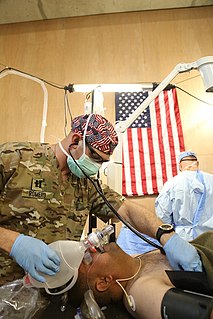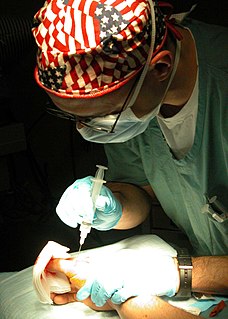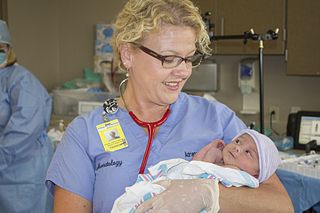Related Research Articles

A registered nurse (RN) is a nurse who has graduated from a nursing program and met the requirements outlined by a country, state, province or similar government-authorized licensing body to obtain a nursing license. An RN's scope of practice is determined by legislation, and is regulated by a professional body or council.

A nurse anesthetist is an advanced practice nurse who administers anesthesia for surgery or other medical procedures. They are involved in the administration of anesthesia in a majority of countries, with varying levels of autonomy.

A Certified Registered Nurse Anesthetist (CRNA) is a type of nurse in the United States who has received specialized training in nurse anesthesia. CRNAs account for approximately half of the anesthesia providers in the United States and are the main providers of anesthesia in rural America. Historically, nurse anesthetists have been providing anesthesia care to patients since the American Civil War and the CRNA credential came into existence in 1956. CRNA schools issue a master's or doctorate degree to nurses who have completed a program in nurse anesthesia, which ranges from 2–3 years in length.

A paramedic is a healthcare professional, providing pre-hospital assessment and medical care to people with acute illnesses or injuries. In Canada, the title paramedic generally refers to those who work on land ambulances or air ambulances providing paramedic services. Paramedics are increasingly being utilized in hospitals, emergency rooms, clinics and community health care services by providing care in collaboration with registered nurses, registered/licensed practical nurses and registered respiratory therapists.
A licensed practical nurse (LPN), in much of the United States and Canada, is a nurse who cares for people who are sick, injured, convalescent, or disabled. In the United States, LPNs work under the direction of physicians, mid-level practitioners, and may work under the direction of registered nurses depending on their jurisdiction.

A nurse practitioner (NP) is an advanced practice registered nurse and a type of mid-level practitioner. NPs are trained to assess patient needs, order and interpret diagnostic and laboratory tests, diagnose disease, formulate and prescribe medications and treatment plans. NP training covers basic disease prevention, coordination of care, and health promotion, but does not provide the depth of expertise needed to recognize more complex conditions.
An advanced practice nurse (APN) is a nurse with post-graduate education and training in nursing. Nurses practicing at this level may work in either a specialist or generalist capacity. APNs are prepared with advanced didactic and clinical education, knowledge, skills, and scope of practice in nursing.
The Doctor of Nursing Practice (DNP) is a professional degree in nursing. In the United States, the DNP is one of three doctorate degrees in nursing, the others being the research degrees PhD and the Doctor of Nursing Science. Internationally, since the 1990s, there have been a wide number of doctorate degrees available for nurses, including DProf, PhD and others. Internationally all such doctoral nursing degrees include mandatory research elements and take longer than a single year to complete.
Nursing credentials and certifications are the various credentials and certifications that a person must have to practice nursing legally. Nurses' postnominal letters reflect their credentials—that is, their achievements in nursing education, licensure, certification, and fellowship. The letters usually appear in the following order:

Nursing in Australia has evolved in training and regulation since the 19th century.
In the United States, anesthesia can be administered by physician anesthesiologists, an anesthesiologist assistant, or nurse anesthetist.

Samuel Merritt University (SMU) is a private university focused on health sciences and located on the Summit campus of the Alta Bates Summit Medical Center in Oakland, California. It is an affiliate of the Sutter Health Network and Alta Bates Summit Medical Center. It is the only provider of physical therapists, occupational therapists, and physician assistants and is the largest source of nurses in the greater East Bay. Formerly known as Samuel Merritt College, it was founded in 1909 as a hospital school of nursing.

A family nurse practitioner (FNP) provides continuing and comprehensive healthcare for the individual and family across all ages, genders, diseases, and body systems. Primary care emphasizes the holistic nature of health and it is based on knowledge of the patient in the context of the family and the community, emphasizing disease prevention and health promotion.
Nursing is a profession within the health care sector focused on the care of individuals, families, and communities so they may attain, maintain, or recover optimal health and quality of life. They also take on vital roles of education, assessing situations, as support. Nurses may be differentiated from other health care providers by their approach to patient care, training, and scope of practice. Nurses practice in many specialties with differing levels of prescription authority. Nurses comprise the largest component of most healthcare environments; but there is evidence of international shortages of qualified nurses. Many nurses provide care within the ordering scope of physicians, and this traditional role has shaped the public image of nurses as care providers. Nurse practitioners are nurses with a graduate degree in advanced practice nursing. They are however permitted by most jurisdictions to practice independently in a variety of settings. Since the postwar period, nurse education has undergone a process of diversification towards advanced and specialized credentials, and many of the traditional regulations and provider roles are changing.

Nurses in Canada practise in a wide variety of settings, with various levels of training and experience. They provide evidence-based care and educate their patients about health and disease.

A neonatal nurse practitioner (NNP) is an advanced practice registered nurse (APRN) with at least 2 years experience as a bedside registered nurse in a Level III NICU, who is prepared to practice across the continuum, providing primary, acute, chronic, and critical care to neonates, infants, and toddlers through age 2. Primarily working in neonatal intensive care unit (NICU) settings, NNPs select and perform clinically indicated advanced diagnostic and therapeutic invasive procedures. In the United States, a board certified neonatal nurse practitioner (NNP-BC) is an APRN who has acquired Graduate education at the master’s or doctoral level and has a board certification in neonatology. The National Association of Neonatal Nurse Practitioners (NANNP) is the national association that represents neonatal nurse practitioners in the United States. Certification is governed by the National Certification Corporation for Obstetrics, Gynecologic and Neonatal Nursing Specialties (NCC).
Advanced practice registered nurses (APRNs) are registered nurses with graduate degrees in nursing. APRN roles include: certified nurse midwife, clinical nurse specialist, certified registered nurse anesthetist, and nurse practitioner. APRNs assess, diagnose, manage patient medical problems, order diagnostic tests, and prescribe medications. Rules, regulations, and credentialing for APRNs vary by state. This page outlines the regulatory processes for nurse practitioners in Wisconsin, including education, certification, licensing, and credentialing. Regulatory and credentialing processes are continuously changing, and the information contained on this page is current as of November 2015.
Nursing is the largest healthcare profession in the United States, with more than 3.1 million registered nurses. Between 2012 and 2022, employment for nurses is projected to grow by 19 percent, which is more than any other profession. Nurses make up the largest component of staff in hospitals but are also able to provide care in clinic settings, patient's homes, schools, nursing homes, public health agencies, and mental health centers. In addition, nurses can be found in the military, in industry, nursing education, and do health care research. Nurses in these various roles and settings can provide direct patient care and case management, but also develop and establish nursing practice and quality standards within complex healthcare systems. As each degree can provide a different level of care for patients and function in vastly different roles, it is important to differentiate between them. The levels of nursing degrees have different educational requirements, licensure, and credentialing that can vary state to state.
Advanced Practice Registered Nurse (APRN) refers to a nurse with advanced education, typically at least a master's degree, and certification by a national certifying program. The APRN provides specialized and multifaceted care and are able to do 60 to 80 percent of preventative and primary care done by physicians. Minnesota Statutes section 148.171, subd. 3 states that in Minnesota, APRN "means an individual licensed as a registered nurse by the board, and certified by a national nurse certification organization acceptable to the board to practice as a clinical nurse specialist, nurse anesthetist, nurse midwife, or nurse practitionerr".

Sydney Davis is a mother, cattle producer and Certified Registered Nurse Anesthetist CRNA, as well as a member of the South Dakota House of Representatives from the 17th district. Elected in November 2020, she assumed office on January 12, 2021.
References
- ↑ "CARNA 2012 Annual Report". Archived from the original on 2013-09-21. Retrieved 2013-08-19.